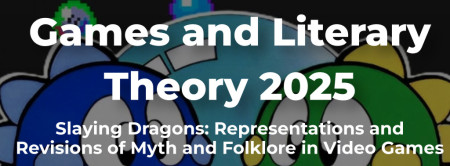Games and Literary Theory 2025

Date: 24.04.2025 - 25.04.2025
Conference / symposium
Format: onsite
Location: Mataró, Spain
Event Fee: Fee
Organizer(s):
Universitat Pompeu Fabra
Games and Literary Theory Conference (GamesLit) is an annual conference for scholars of literature interested in expanding the scope of literary theory, and game scholars concerned with adapting the methodological and theoretical approaches of literary theory for the study of games. This year’s conferece will revolve around the concepts of myth and folklore. The narratives and imagery of myth and folklore are an essential part of the history of video games, with early cases such as Wizardry: Proving Grounds of the Mad Overlord (Sir Tech, 1981), Ultima I: The First Age of Darkness (Garriott, 1981), and newer hits such as Wukong: Black Myth (Game Science, 2024). Myths and folklore have become increasingly popular for exploring contemporary issues in mainstream video games, such as Hellblade: Senua’s Sacrifice (Ninja Theory, 2017), which takes inspiration from Nordic and Celtic folklore trauma and mental health. Often approached now by fans through the lens of the lore, we would like to inquire into the narrative construction of myth and folklore in games and their potential to renew the tales and stories from different traditions as well as their capacity to prompt the creation of new myths. As Juliette Wood (2018: 2) summarises, “myths, legends and folktales emerge as oft-repeated narratives with changing cultural significance that can merge with other genres”. Myths can be understood as the narratives of the sacred, the supernatural and the heroic (Eliade, 1963) and how these are perpetuated through tradition and ritual (Jung and Kerényi, 2001). But myths may also be conceived as those stories and motifs which are continuously repeated in the present and naturalised in social imaginaries and sociopolitical concerns and ideologies (Martínez García, 2017; Barthes, 1993) and thus become essential tools to understand the world we inhabit (Coupe, 2009). Within this framework, we invite proposals that study contemporary readings of myths and folklore in video games and the way in which video games may create new myths through repetition and naturalisation of ideas. In addition, we can think of the myriad fantastic creatures from different cosmologies that permeate games and which invite us to think both “the marvellous and the monstruous” within ambiguous margins (Wood, 2018: 4). Following last year’s focus on adaptation, games participate in the circulation, repetition, and rejuvenation not of specific stories, but of structures and motifs that shape myths. Games allow us to see the transformations of myths and the fantasy genre and we would like to invite speakers to think of the narratives and structures of myth and folklore and the dialogues between genres. Some possible topics might be but are not limited to: Local and global myths and folklore in games. The semiotics and poetics of myths in games. The structures of myth and folklore in games. Revisions and subversions of myths. The genres of myth and folklore. Circulation of myths and motifs between literature and games. Ideology in games.
https://videojocs.tecnocampus.cat/games-literary-theory-2025/
Post created by: Lymor Wolf Goldstein